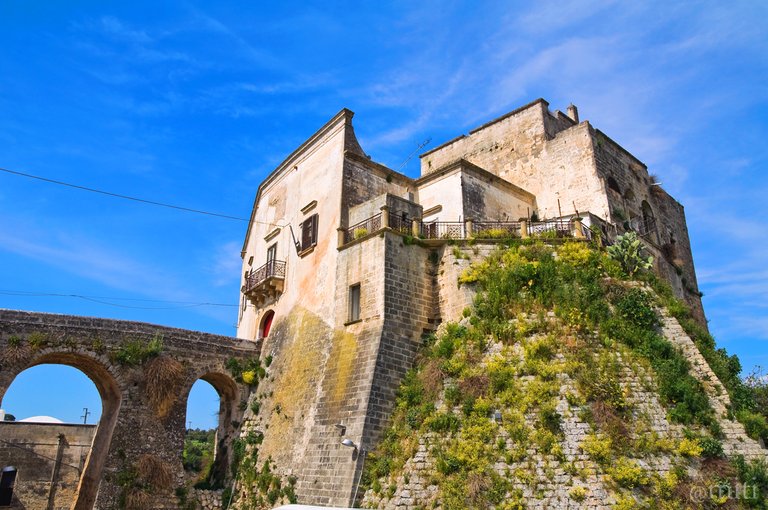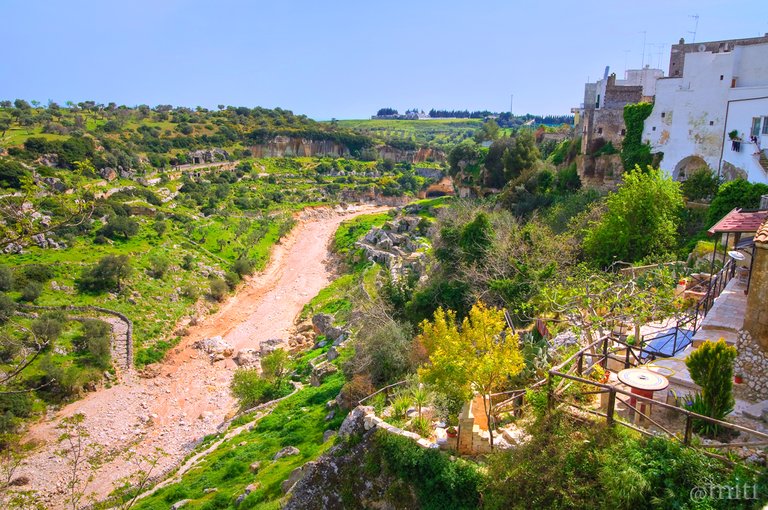
The Norman Castle (Author's photo - All rights reserved)
Il Castello Normanno (Immagine dell'autore - tutti i diritti sono riservati)



Ciao a tutti,
questo è un viaggio attraverso l'Italia. Posterò una foto al giorno con una brevissima descrizione. Spero vi piaccia!

Ginosa è un piccolo borgo della provincia di Taranto, nella regione italiana meridionale della Puglia. Situato a circa 240m slm, è l'ultimo paese della provincia ionica al confine con la Basilicata.
Comprende un territorio vasto e diversificato che si estende dalle fertili pianure al mare, dalle colline alla Murgia, circondato per 3 km da un canyon selvaggio, un tempo difesa dell'intera pianura.
Ginosa è la Genusia di cui parla Plinio, una città con una storia antica. Il suo villaggio, chiamato Casale, era un insediamento rupestre scavato in grotte di tufo. Era già abitata in epoca neolitica, in seguito dai Messapi (popolazione italica con origini nella zona).
Era una colonia greca, prima e in seguito una colonia romana. Nel Medioevo, pur essendo dotato di un castello normanno, costruito nel 1080 da Roberto il Guiscardo, fu attaccato e passato nelle mani di molti feudatari. Il nuovo insediamento risale al XVI secolo e la Rinascimentale Chiesa Madre ne è la prova.
Nelle pareti del canyon esiste un gran numero di grotte, con chiese rupestri finemente decorate (per esempio gli insediamenti di Santa Sofia e Santa Barbara, quest'ultimo risalente al Medioevo e caratterizzato da un vestibolo e tracce di affreschi sulle pareti), un segno tangibile della stratificazione della presenza umana nel corso dei secoli.
Il villaggio di Rivolta, abitato fin dal Medioevo, si presenta come un ammasso di case-grotte interamente scavate nella roccia scaglionate lungo cinque livelli sovrapposti. Rappresenta una complessa struttura urbana costruita in pietra caratterizzata da numerosi spazi sotterranei, cisterne, strade, scale e ancora jazzi e giardini pensili. Alcune delle abitazioni primitive conservano anche nicchie, anelli, mangiatoie e abbeveratoi.
Alla fine del Medioevo ci fu un lento declino della civiltà delle caverne e gli abitanti iniziarono a spostarsi verso la zona collinare dove oggi si trova effettivamente la città.
Il comune comprende anche la frazione di Ginosa Marina, una delle località balneari maggiormente frequentate dell' area jonica.
Cosa vedere: Il Centro Storico, il Castello Normanno, la Chiesa Madre, la Torre dell'Orologio, la gravina, il Parco Archeologico di Santa Maria Dattoli, il borgo di Rivolta, le Chiese rupestri, la frazione di Ginosa Marina.

Hello everyone,
I began a Photo Journey through Italy. I will post one photo every day with a little note of explanation. I hope you like it!

Ginosa is a small town in the province of Taranto, in the southern Italian region of Puglia. Located at about 240 m a.s.l., it is the last town in the Ionian province bordering with Basilicata.
It includes a vast and diversified territory that stretches from the fertile plains to the sea, from the hills to the Murgia, surrounded for 3 Km by a wild canyon, once the defence for the entire plain.
Ginosa is the Genusia mentioned by Plinius, a town with an ancient history. Its village, called Casale, was a rock settlement dug in tuff caves. It was already inhabited in the Neolithic age, later by the Messapi (Italic population with origins in the area).
It was a Greek colony, first, and then a roman colony. In the Middle Ages, although provided with a Norman castle, built in 1080 by Roberto il Guiscardo, it was attacked and passed into the hands of many feudatories. The new settlement dates back to the XVI century and the Renaissance Mother Church provides the evidence of it.
A great number of caves exist in the walls of the canyon, with finely decorated rock churches (e.g. the Santa Sofia and Santa Barbara settlements, the latter dating back to the Middle Ages and characterized by a vestibule and traces of frescoes on the walls), a tangible sign of the stratification of human presence over the centuries.
The village of Rivolta, inhabited since the Middle Ages, presents itself as a cluster of cave-houses entirely carved out of rock staggered along five superimposed levels. It represents a complex rock-built urban layout characterized by numerous underground spaces, cisterns, streets, staircases, jazzi pens and hanging gardens. Some of the primitive dwellings still preserve alcoves, mengers, rings and drinking troughs.
At the end of the Middle Ages there was a slow decline of the cave civilization and the inhabitants started to move towards the hill area where the town actually is situated.
The town district includes the suburb Ginosa Marina, one of the most important beach resorts of the Ionian area.
Thing to see: The Historic Centre, the Norman Castle, the Mother Church, the Clock Tower, the Ravine, the Archaeological Park of St. Mary Dattoli, the village of Rivolta, the rupestrian Churches, the suburb Ginosa Marina.

| Tipo di foto / Category | Paesaggio / Landscape view |
| Esposizione / Settings | 1/320 sec, ISO 200, f/10 |
| Camera | Nikon D5000 |
| Lente / Lens | Tamron SP 17-50mm f/2.8 XR Di II LD |
| Filtro / Filter | Polarizzatore Hoya / Hoya Polarizing filter |
| Cavalletto / Tripod | Manfrotto MKC3-P01 |
| Località / Location | Ginosa (Taranto), Italia |
| Software | Photoshop / HDR |


Ginosa cave settlements (Author's photo - All rights reserved)
Insediamento rupestre di Ginosa (Immagine dell'autore - tutti i diritti sono riservati)
wonderful photos.
Congratulations, Your Post Has Been Added To The Steemit Worldmap!
Author link: http://steemitworldmap.com?author=mitiPost link: http://steemitworldmap.com?post=a-journey-through-italy-one-photo-every-day-113-ginosa-eng-ita
Want to have your post on the map too?
Che bello citta sul tufo sono bellissime e le cave per me hanno un certo fascino. Io qualche weekend orsono sono stata a Lucchio, anche lui un paesino praticamente costruito su cave,poi faró un post a proposito. Comunque bellissima.
Grazie.. aspetto il tuo post allora, a Lucchio non ci sono mai stato.
@miti yet another beauty of Italy,This is also beautiful.You have very beautifully explained about GINOSA. I must really appreciate your blog for such detailed information in short.Thanks for sharing.
You're welcome!
... sempre ottime descrizioni ottimi spunti.
Grazie mille Giorgio!
So each cave is a church? Happy start of the week, friend miti.
Hello my friend! No... there're cave-houses and churches.
Spettacolo sto posto! :-D
Si, davvero! Le chiese rupestri hanno degli affreschi affascinanti.
Mi piace anche la vegetazione intorno un po' selvatica :-D
@miti yeah another beauty from italy
;-)
I enjoy reading your story
Thanks!
Look like .. we can do photo shoot
Italy is great, I like Italian cuisine very much, pasta made in different ways is great, I live in Poland, but I often eat Italian dishes, I have to try some real Italian dishes one day.
As you can see, Italy is not just food!
Nice location, I wanna visit it some day...Hope I didn't die before visiting the place
Good God, I should hope not!
You got a 37.40% upvote from @ocdb courtesy of @miti!
This is actually so gorgeous wow!!
Howdy partner, I'm @raido96, a curation bot; I keep an eye on the photo feeds, I vote random photos of my followers and at the end of the day I publish a post with links to the 5 best photos. Follow @ raido96 to get your photos curated in the future!
Bello paisaje
Beautiful picture
Stay safe with photography
https://steemit.com/hacking/@ashokroy79/save-your-finger-print
Excellent article. I really liked it. Good luck to you and Love.
Nice photography
Posted using Partiko Android
Your comment is considered SPAM... Take a look in this guide:
https://steemit.com/steemit/@miti/a-complete-guide-for-newcomers-and-minnows-to-avoid-a-possible-spam-and-to-write-good-comments
It will help you.